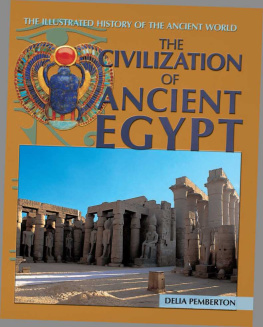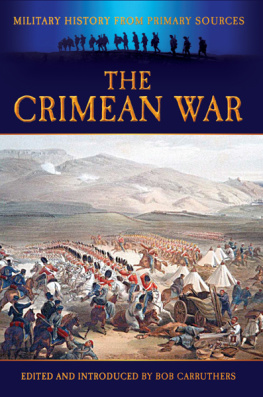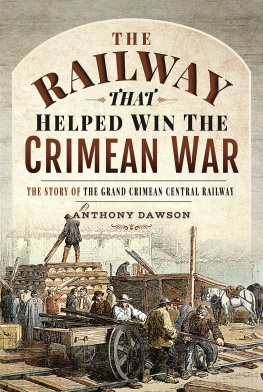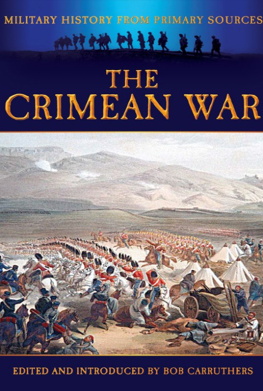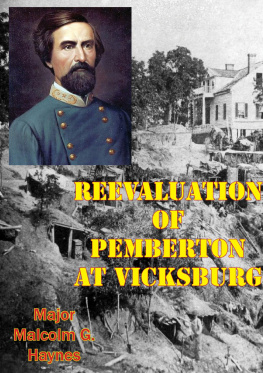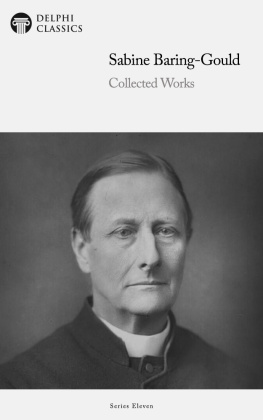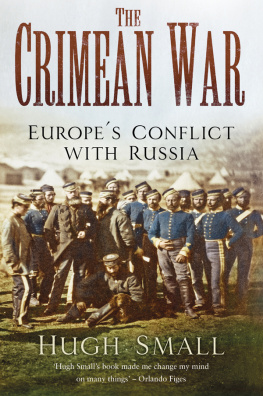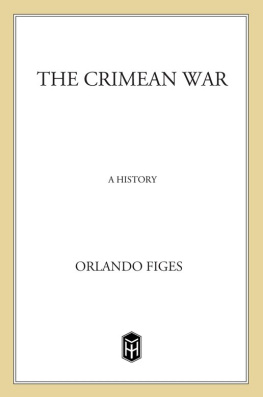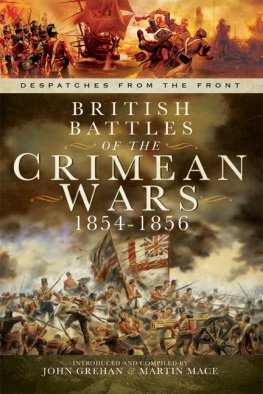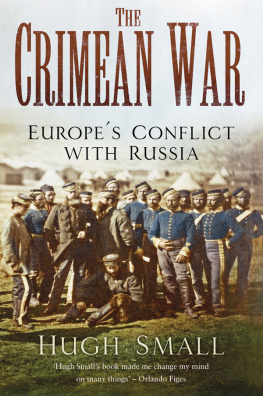This edition is published by BORODINO BOOKSwww.pp-publishing.com
To join our mailing list for new titles or for issues with our books borodinobooks@gmail.com
Or on Facebook
Text originally published in 1961 under the same title.
Borodino Books 2017, all rights reserved. No part of this publication may be reproduced, stored in a retrieval system or transmitted by any means, electrical, mechanical or otherwise without the written permission of the copyright holder.
Publishers Note
Although in most cases we have retained the Authors original spelling and grammar to authentically reproduce the work of the Author and the original intent of such material, some additional notes and clarifications have been added for the modern readers benefit.
We have also made every effort to include all maps and illustrations of the original edition the limitations of formatting do not allow of including larger maps, we will upload as many of these maps as possible.
BATTLES OF THE CRIMEAN WAR
BY
W. BARING PEMBERTON
PREFACE
The Crimean War has been called the last great war to be fought without the help of modern resources of science. It was also the last great war to be fought by the British army in all its splendour of scarlet and gold, using weapons and tactics which would not have astonished the Prince Rupert or the Duke of Marlborough. To those who today have vivid recollections of modern warfare, battles such as the Alma, with columns of infantry volleying into each other at close range, field officers galloping about conspicuous on horseback, company commanders out in front of their men waving their swords, ensigns bravely carrying the Colours, or Balaclava, with its two spectacular cavalry charges, are hardly less remote than Naseby or Malplaquet. Yet many who fought in the First, and not a few who fought in the Second, World War will have known personally those who took part in such battles and heard their accounts from their own lips. Sir Fitzroy Maclean, probably the last survivor, died as recently as 1936. So near and yet so distant is the Crimean campaign.
On the other hand no campaign should be more familiar, because none has been covered more fully and more candidly. Not only did the aftermath of every battle result in a flood of uncensored letters (which incidentally were subjected to the full foreign postage rate of three-pence per quarter-ounce), but that novel intruder, the war-correspondent, was able to send back the most elaborate accounts, complete with revealing details and outspoken comments, all without any official impediment whatsoever. The historian of the Crimean battles has then (it would appear) only to make a synthesis of the innumerable letters and reports and his story is complete. Unfortunately this is not so. With smoke from the black powder then used drifting across the battlefield, lying heavily over batteries, the combatant could often see and report little more than what had happened in his vicinity; and even in this he is not necessarily reliable as this sentence from a letter from Lenox Prendergast of the Scots Greys proves:
Anyone who has been in a serious action knows how impossible it is even after a few hours not to fancy that incidents told one by some-body else are not part of ones own experience.
Nor, for much the same reasons, was the spectator or war-correspondent more favourably advantaged.
The impressions conveyed to my mind [wrote the surgeon of the 93rd] even through mine eyes, it would appear, were not minutely accurate; and yet I thought so at the time and their inaccuracy only proves that even an onlooker may know little of what occurs in a battle and the same incident seen by several at the same time may be differently described by all, and yet each individual speak with the confidence of being exact.
As for those who recollected in tranquillityand there were manyit is enough to record the remark of a contemporary Canadian military historian: Memory can play tricks upon an officer after some lapse of time, especially when the officers own interest and prejudice are engaged.
Beset by these difficulties the writer who surrounds every incident with reservations and qualifications will rapidly weary his readers. He must on matters of moment, such for example as Nolans responsibility for the Light Brigade charge, use his judgment on the evidence available and make up his own mind. This I have tried to do. If my interpretation of any controversial point offends, I can only say that it was not hurriedly made.
Without the help of those who most kindly lent me manuscript material or books, who advised me and patiently answered my questions, I could have done very little. It is therefore with the greatest of pleasure that I thank Mrs. Bradford for the Vaughan Lee letters; Colonel Henry Clowes for those of Cornet Clowes; Mr. Dashwood for the letters of Lieutenant Fletcher, R.N.; Sir Arthur Elton, Bt., for the Elton letters from the Clevedon Court Archives; Mr. Cuthbert Fitzherbert for the Diary of James Godfrey and also for allowing me to quote extensively from the published letters of Henry Clifford, V.C.; to Captain Haly, R.N., for the letters of Colonel Haly; Mrs. Hamilton for the Journal of Lieutenant Patrick Robertson; Major-General Hibbert for the letters of Captain Hugh Hibbert; Sir James Hunter Blair Bt., for the Diary of Colonel Hunter Blair; Lady Jones for the Journal and Letters of Ensign Boscawen Griffith; Air Vice-Marshal McClurkin for the letters of Michael Heneage; Brigadier Maude for the Diary, papers and privately printed letters of Captain George Maude; my friend Major John Maxse for permission to examine the Maxse Papers; Major Paton for the letters of James Paton; Mr. A. G. Shireff for the letters of Colonel James Patullo; Lady Skipwith for the letters of her grandfather Captain Alfred Tipping; Mrs. Somerset for the letters of William Pechell; Colonel W. A. Stirling for the letters of his father Sir William Stirling and his uncles Francis and Charles; Mr. H. E. Sutton for the letters of Major Edward Phillips; Mrs. Patricia Taylor for the letters of Dr. John McNeece and Mrs. Wombwell for the letters of Sir George Wombwell.
A large number of people have lent me single letters or small collections, maps and books (some of them privately printed) for which I am most grateful. These include Mrs. P. J. Roberts, Miss Babbage, Mr. John Brooks, Dorothea de Culwen, Mr. R. J. Cooper, Mrs. Clure, Miss Chute, Mrs. Greenacre, Colonel F. C. Hitchcock, Miss Helen Landon, the Rev. W. H. Cormack, W. Hallgarth, Mr. Sergeant, Mrs. Riley and Mr. H. Skelton (both for gift of books).
I have to thank Mr. H. F. Longmore for two volumes of cuttings compiled by his father Dr. Thomas Longmore of the 19 th Regiment and Mr. Christopher Hibbert for putting at my disposal the results of some of his researches for his admirable life of Lord Raglan.
As I had anticipated regimental archives yielded a rewarding harvest. From the Grenadier Guards came the letters of Henry and Grey Neville, from the Coldstream those of Gerald Goodlake and Clarke Jervoise; from the Scots Guards the diaries of Colonel Haygarth and Corporal Dolton; from the Gloucestershire Regiment the letters of Major James Williams and Colonel Frank Adams; from the Dorset Regiment the letters of Colonel Tinley; from the Black Watch the Diary of Captain Montgomery; from the Middlesex Regiment eighty-one letters from Major A. M. Earle. The Lancashire Fusiliers allowed me to examine a collection of letters dealing with Inkerman and the Royal Artillery Institution lent me the letters of Corporal Mitchell, Lieutenant Richards and Surgeon A. H. Taylor. Other regiments, the Green Howards, the Duke of Wellingtons, the Sherwood Foresters, the Kings Own, the Lancashire, the Border and the Manchester regiments lent me regimental histories or bound copies of their magazine, and to these I should like to express my thanks.





